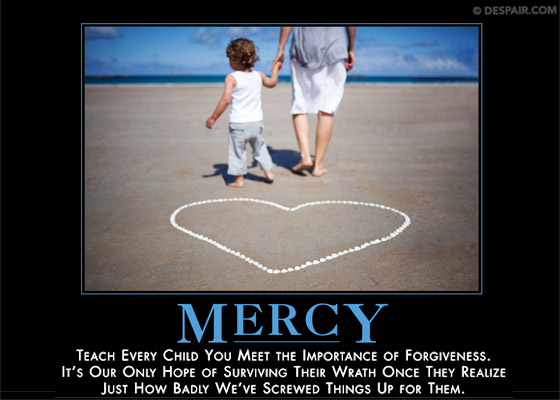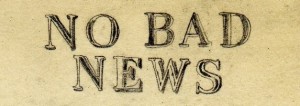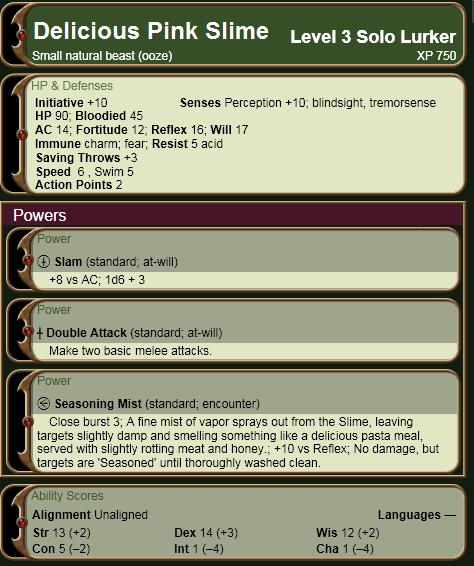“I know why the caged bird sings…”
art, books, business and economy, comics and animation, event, everyday glory, food for thought, games, geekery, health, history, movies and TV, opera, science and technology, stage plays and theatre, style and fashion, Whiskey Tango Foxtrot...?! February 10th, 2011Thursday – 10 February 2011
Another NBN Thursday is upon us.
Last night was D&D (4.0) game night. We started a new encounter, created by
- A goblin corpse (the goblin we’d been chasing, in fact) and
- A pink slime
For those of you – like me – who have never encountered Item #2 before, allow me to share with you a little insight:
The key thing to note there is its “Seasoning Mist.” All but two of us were caught in the mist… which nearly turned us into a party of cannibals. Nearly. Instead, a few of us (those who missed our saving throws) wound up eating some of the carrion in the area. Yeah, it was like that. We managed to survive the encounter.
Back at home, SaraRules! and I tackled another recorded episode of NCIS and a couple of other shows before she called it a night and I dove into yesterday’s four-color haul.
Chew on This: Food for Thought – Black History Month
Today’s item is Juneteenth.
Juneteenth, also known as Freedom Day or Emancipation Day, is a holiday in the United States honoring African American heritage by commemorating the announcement of the abolition of slavery in the U.S. State of Texas in 1865. Celebrated on June 19, the term is a portmanteau of June and nineteenth, and is recognized as a state holiday in 36 states of the United States.
Though Abraham Lincoln issued the Emancipation Proclamation on September 22, 1862, with an effective date of January 1, 1863, it had minimal immediate effect on most slaves’ day-to-day lives, particularly in the Confederate States of America. Texas, as a part of the Confederacy, was resistant to the Emancipation Proclamation, and though slavery was very prevalent in East Texas, it was not as common in the Western areas of Texas, particularly the Hill Country, where most German-Americans were opposed to the practice. Juneteenth commemorates June 18 and 19, 1865. June 18 is the day Union General Gordon Granger and 2,000 federal troops arrived in Galveston, Texas, to take possession of the state and enforce the emancipation of its slaves. On June 19, 1865, legend has it while standing on the balcony of Galveston’sAshton Villa, Granger read the contents of “General Order No. 3”:
The people of Texas are informed that, in accordance with a proclamation from the Executive of the United States, all slaves are free. This involves an absolute equality of personal rights and rights of property between former masters and slaves, and the connection heretofore existing between them becomes that between employer and hired labor. The freedmen are advised to remain quietly at their present homes and work for wages. They are informed that they will not be allowed to collect at military posts and that they will not be supported in idleness either there or elsewhere.
Stray Toasters
- On the way to work this morning, I was listening to X96’s Radio From Hell morning show. They had an interview with Gregory Bright, who – after serving 27 years in prison for a second-degree murder charge – was released from prison due to wrongful conviction. Mr. Bright and Lara Naughton have turned his story into a one-man play, called Never Fight a Shark in Water, which is being performed at the University of Utah this evening; there is no admission charge for the performance. For more information about tonight’s performance, click here.
- Breakout Style
- Fooducate: Eat a Bit Better
- Houston Opera Still Embraces Bold Ventures
- From the “Whiskey Tango Foxtrot…?!” file: 7-Year-Old Buys Harrier Jet — Then Gets Dreams Shattered

- Medical Treatment, Out of Reach
- Navigating the new UI at Gizmodo will take some getting used to…
- ‘Superman’ artist Joe Shuster’s lurid comic world exposed

- Girls Love Gadgets, Too: Gifts for Your Geeky Sweetie
- Black Metal Greeting Cards
Namaste.
Leave a Reply
You must be logged in to post a comment.


